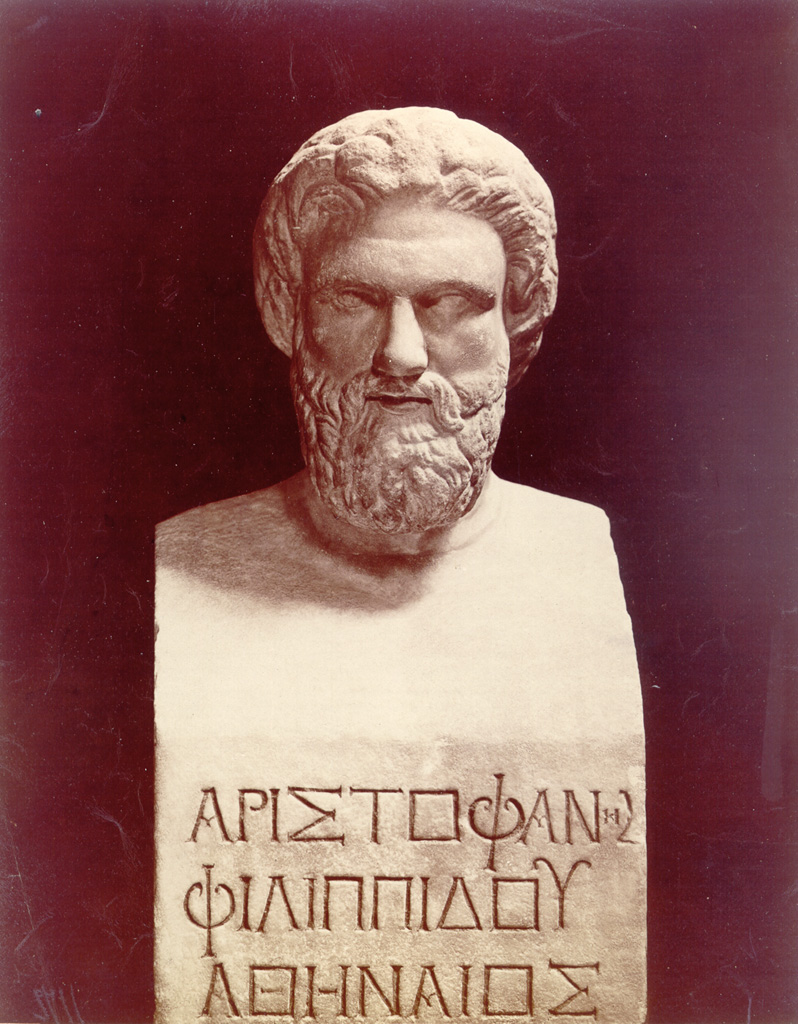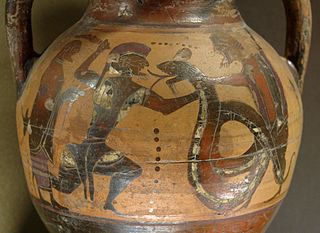Ameipsias (Ancient Greek : Ἀμειψίας, fl. late 5th century BC) of Athens was an Ancient Greek comic poet, a contemporary of Aristophanes, whom he twice bested in the dramatic contests. His Konnos (Κόννος) gained a second prize at the City Dionysia in 423, when Aristophanes won the third prize with The Clouds . [1] [2]
Floruit, abbreviated fl., Latin for "he/she flourished", denotes a date or period during which a person was known to have been alive or active. In English, the word may also be used as a noun indicating the time when someone flourished.

Ancient Greece was a civilization belonging to a period of Greek history from the Greek Dark Ages of the 12th–9th centuries BC to the end of antiquity. Immediately following this period was the beginning of the Early Middle Ages and the Byzantine era. Roughly three centuries after the Late Bronze Age collapse of Mycenaean Greece, Greek urban poleis began to form in the 8th century BC, ushering in the Archaic period and colonization of the Mediterranean Basin. This was followed by the period of Classical Greece, an era that began with the Greco-Persian Wars, lasting from the 5th to 4th centuries BC. Due to the conquests by Alexander the Great of Macedon, Hellenistic civilization flourished from Central Asia to the western end of the Mediterranean Sea. The Hellenistic period came to an end with the conquests and annexations of the eastern Mediterranean world by the Roman Republic, which established the Roman province of Macedonia in Roman Greece, and later the province of Achaea during the Roman Empire.

Aristophanes, son of Philippus, of the deme Kydathenaion, was a comic playwright of ancient Athens. Eleven of his forty plays survive virtually complete. These provide the most valuable examples of a genre of comic drama known as Old Comedy and are used to define it, along with fragments from dozens of lost plays by Aristophanes and his contemporaries.
Konnos appears to have had the same subject and aim as Clouds. It is at least certain that Socrates appeared in the play, and that the Chorus consisted of Φροντισταί. [3] [4] Aristophanes alludes to Ameipsias in The Frogs , [5] and we are told in the anonymous life of Aristophanes, that when Aristophanes first exhibited his plays under the names of other poets, Ameipsias applied to him the Greek proverb τετράδι γεγονώς, which means "a person who labours for others," an allusion to Heracles, who was born on the fourth of the month.
The Frogs is a comedy written by the Ancient Greek playwright Aristophanes. It was performed at the Lenaia, one of the Festivals of Dionysus in Athens, in 405 BC, and received first place.

Heracles, born Alcaeus or Alcides was a divine hero in Greek mythology, the son of Zeus and Alcmene, foster son of Amphitryon. He was a great-grandson and half-brother of Perseus. He was the greatest of the Greek heroes, a paragon of masculinity, the ancestor of royal clans who claimed to be Heracleidae (Ἡρακλεῖδαι), and a champion of the Olympian order against chthonic monsters. In Rome and the modern West, he is known as Hercules, with whom the later Roman emperors, in particular Commodus and Maximian, often identified themselves. The Romans adopted the Greek version of his life and works essentially unchanged, but added anecdotal detail of their own, some of it linking the hero with the geography of the Central Mediterranean. Details of his cult were adapted to Rome as well.




